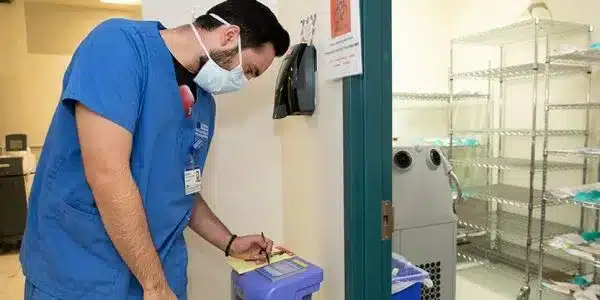One of the most pressing concerns during the pandemic, for Northern Arizona Healthcare and health systems across the country, has been the availability of N95 respirators. These masks are an essential part of the PPE worn by front-line caregivers.
In the first weeks of the outbreak, a group of colleagues across NAH was tasked with finding ways to secure adequate supplies of N95’s. They searched not only for new vendors but also for new ideas, to make sure providers and nurses had access to the equipment they needed.
“And when we started looking at that further, right around the time we were looking into it, Duke had an article published in a popular online magazine, I can’t remember which one it was, that said that they were using Bioquell for their decontamination…and so I went ahead and called Duke and found out who I needed to talk to. I ended up talking to one of their directors of infectious disease who sent me their protocol and their study that they were getting ready to publish. So we kind of got it about a week ahead of it going to American Association of Critical Care Nurses for their conference call with a bunch of critical care partners,” according to Catherine Harpst, System Quality Director at NAH’s Flagstaff Medical Center. “Chris (Singleton) had also called Duke around the same time and got one of the process people that same day. We both got things from Duke to allow this to happen.”
Lori Smithson, VVMC’s Director of Surgical and Patient Services describes the protocol, “We collect masks on our COVID positive and our COVID rule-out units. We collect those masks, and then we bring them down here to the old bio-med area. Where we put them on shelves, and wire wraps, and separate them, and get them ready for reprocessing with our Bioquell.”
National leader
Every mask processed is inspected for integrity before and after decontamination. As a result of the program, NAH has provided sterile masks for single use throughout the crisis. It’s a standard that not many hospitals in the country’s hot zones have been able to match.
“Well I think that there’s some misinformation out there about that because I think that we’ve heard some comments from some colleagues such as, ‘Well why are we doing this? Why are we reprocessing masks and reusing them?’ And we’ve had a lot of education with our colleagues to say, ‘Well actually we’re exceeding standards in terms of being in a crisis of care situation with N95s which the country is in. You guys are actually getting cleaned masks with a six log kill.’ So we are providing you the safest level of care possible under these circumstances.”
Equipment management and sterilization specialist Brandon Luna adds, “It makes me feel great that we can reuse and keep up our supply of PPE, so we can treat everyone and remain safe ourselves. I think it’s great that we can use this process, so we don’t have to rely on outside sources of PPE and other sterile equipment.”
Helping our partners
After the program was established and the immediate danger of PPE shortages had passed, NAH began hearing from outside agencies that were facing the same difficulties. Now the system is helping to decontaminate masks for other front-line caregivers in the region.
“So we have reached out to EMS in both Verde and Flagstaff. We have contracted with the city of Flagstaff and Spectrum down in Verde Valley and we’re working on extending contracts to other outside facilities. The Peaks is another one we’ve recently contracted with. It’s what we should be doing and, and doing this at no charge, because we’re all in this together. Our entire team is just thrilled to be able to help our colleagues because we’re all in this together and we want to protect our staff, all health care staffs, and our community,” says Harpst.
The decontamination project is a testament to the hard work and dedication of the NAH team according to Smithson, “I’m very excited that we are able to do this. Because protecting our staff members is our number one priority. And through this crisis, it’s been very heart-wrenching to make sure that we’ve had the amount of PPE that we’ve needed. It’s been a big focus on us, as NAH, as a whole.”
The system would like to recognize these colleagues and the many others that make up their teams; Glen Green, Catherine Harpst, Brandon Luna, Barb Mesa, Jodi Pelkey, Leanne Peterson, Chris Singleton, Lori Smithson, and Tim Topell. Their efforts on this project have improved safety for all our front-line workers.
